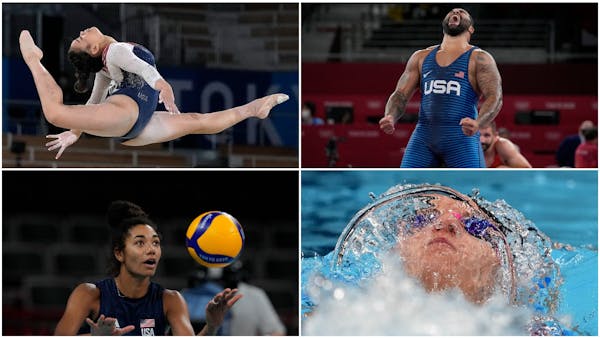 See
more of the story
See
more of the story
TOKYO — Erriyon Knighton, America's 17-year-old sprinting phenom, ran through the finish line, then bounded to the bottle.
In a moment that epitomized the so-called 2020 Tokyo Olympics, Knighton, in a matter of seconds, qualified for the 200-meter final, bounced with joy, ran a finger under the USA logo on the front of his jersey, then swerved left to sanitize his hands.
There you have the in-actuality 2021 Games: ambition, achievement, precociousness, unleashed emotion, national pride and constant COVID awareness.
The Tokyo Games were postponed, embattled, questionable and constantly at risk. On the last Thursday of the Games, Tokyo set a record with more than 5,000 positive COVID-19 cases. Athletes and workers tested positive, and at least one ugly American, swimmer Michael Andrew, refused to wear a mask or get vaccinated.
We'll know sometime in the near future whether the IOC and its bosses at NBC should have held the Games. What those of us who were here know is that the games themselves were inspiring.
The people on the ground made this a great Olympics.
Not the IOC. Not the networks. Not the government. We're talking about the athletes and the Japanese people who volunteered, ran the venues, worked at the hotels, drove the taxis, manned the security stations, drove the buses and nodded to you in the street.
Taxi drivers in Tokyo wear suits and keep their cars immaculately clean, inside and out, and if that isn't the way we judge a society, maybe it should be.
What you realize after three weeks here is that you never waited in line. Lines are an organization's way of telling you that you, or at least your time, don't matter. This city and operation were so efficient that I can't remember ever looking at my watch on my way into a venue.
The people here treat you like royalty whether you deserve it or not, and many of the athletes imbued their usual otherworldly performances with the kind of humility and self-awareness that might once have been misjudged as weakness.
Simone Biles withdrew, for her own mental health and physical safety. Good for her.
Suni Lee, a recent graduate of South St. Paul High, succeeded her teammate as the world's best gymnast, with a performance that will live in Minnesota history, if we're being provincial, and gymnastics history, if we're not. Good for her, and us.
Two high-jumpers decided to share a gold medal, offering a reminder that the Olympics were conceived as a way to build virtual bridges between countries, not stoke nationalistic rage.
The Tokyo Games may be remembered as the Mental Health Olympics.
Athletes spoke constantly of the challenges they've faced, stemming from the postponement of the Olympics and the uncertainty that they would ever occur, to the pressures piled on them from media, social media and the NBC hype machine.
The athletes demanded to be viewed as fully formed human beings, replete with weaknesses, anxieties, flaws and everyday problems. They are normalizing mental health awareness, a conversation that can benefit everyone.
Every day provided a new, profoundly human story. Minnesota athletes provided the two that I'll remember most.
Lee, daughter of Hmong immigrants who grew up in St. Paul, produced perhaps the defining moment of a compelling Olympics. At 18, with Biles' spotlight suddenly blazing in her eyes, Lee performed with grace and bravery to win the individual all-around gymnastics gold medal.
Joseph Fahnbulleh, son of Liberian immigrants who grew up in Hopkins, raced for Liberia in the 200 meters and finished fifth in the world, three spots behind Kenny Bednarek of Rice Lake, Wis.
Lee, in one night, became an international superstar who will now try to become a normal, backpack-carrying freshman at Auburn.
Fahnbulleh became the most charming kind of local story, a Minnesota athlete beloved at his high school who, rather than conquering the world in his first try, introduced himself to it.
Their parents emigrated to give their children better lives, and their children took full advantage.
Tokyo is a massive and beautiful city featuring clean streets, clean trains and clean taxis. It's easy to say that you'd like to visit in better times, but thanks to the people on the ground, in many ways these were good times.







